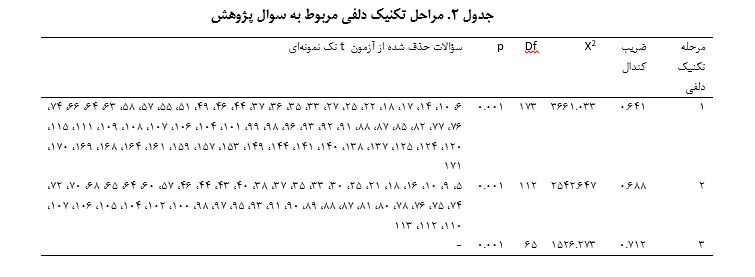Identifying Dimensions, Components, and Indicators of Professional Ethics for Managers in Small and Medium-Sized Enterprises
Keywords:
Professional ethics, managers, individual factors, organizational factors, small and medium-sized enterprises, thematic analysis, Delphi techniqueAbstract
This study aimed to identify the dimensions, components, and indicators of professional ethics for managers in small and medium-sized enterprises. This research was conducted using a qualitative approach and thematic analysis. Data were collected through semi-structured interviews with experts in the field of ethics and organizational management. Purposeful sampling continued until theoretical saturation was achieved. Thematic analysis was performed using MAXQDA version 12, and the Delphi technique was employed in three rounds to validate the findings using Kendall’s coefficient of concordance and one-sample t-tests with SPSS version 25. The results revealed that professional ethics for managers are categorized into five main factors: organizational, environmental, contextual, structural, and individual. Organizational factors included combating organizational self-centeredness and having a strong organizational culture. Environmental factors emphasized the importance of policies and a supportive work environment, while contextual factors highlighted the impact of social and political environments. Structural factors underscored the significance of management styles and trust-building, and individual factors focused on the role of psychological well-being and personal competencies. The Kendall coefficient in the third round of the Delphi technique was 0.712, indicating substantial agreement among experts. The findings suggest that improving professional ethics among managers in small and medium-sized enterprises requires a comprehensive focus on various organizational, environmental, contextual, structural, and individual factors. Implementing transparent policies, promoting participative management styles, and fostering a healthy work environment can enhance managers’ ethical behavior.
Downloads
References
Sheikhabadi I, Bagheri M, Jahed H. Identifying the Supervisory Components of Instructional and Educational Leaders
of Primary Schools in order to Providing a Comprehensive Pattern for Iran's Government Education. Sociology of Education.
;10(1):295-304.
Astereki S, Mehrdad H, Ghobadian m. Identifying the components of the model of professional competencies of
educational managers of education organization. Educational Leadership & administration. 2022;2(16):109-34.
Davoodi M. The Relationship Between Professional Ethics And Organizational Socialization Staff Deputy of
Education Ministry of Health And Medical Education. Journal of Medicine Spiritual Cultivation. 2018;26(4):258-71.
Kaffashpoor A, Samanian M, Rahmdel H. Designing and explaining a professional ethics model for the managers of
the banking industry, using the grounded theory strategy. International Journal of Procurement Management. 2021;14(2):230-
Hossein Zadeh I, Ramezani M, Sanginoorpour A, Amari H, Feghi Farahmand N. Competency Model and Ethics with
a Successor Approach in The Banking Industry. Ethics in Science and Technology. 2022;17(2):117-22.
Jafarinahlashkanani F, Eydivandi Z, Shafiei M, Maraghi E, Moradi Kalboland M. Evaluation of the Facilitating and
Inhibitory Factors of Professional Ethics Standards’ Obsrvance in Nursing Care from the Perspective of Nurses. Iranian Journal
of Medical Ethics and History of Medicine. 2020;13(0):155-67.
Ghalavand H, Panahi S, Sedghi S. Opportunities and challenges of social media for health knowledge management:
A narrative review. Journal of Education and Health Promotion. 2020;9(1).
Mousavi A, Mohammadi M, Safian M. Designing a Competency Model for Managers of Organizational Universities
(Case Study: a University Affiliated with a Military Organization). Irainian Journal of Management in the Islamic University.
;9(20):217-40.
Moghadam Nia E, Toloei Ashlaghi A, Afshar Kazemi M. Analysing the Role of Technology Transfer in the
Professional Ethics of Employees. Ethics in Science and Technology. 2020;15(1):162-5.
Shirvani T, Zohrehvandian K. Relationship between Sports Coach Professional Ethics and Self-Efficacy with respect
to Mediating Role of Competence. Human Resource Management in Sport Journal. 2021;8(2):359-77.
Gholipor R, Hassan Gholipour Yasoori T, Taghavi A. A Paradigm Model of Good Corporate Governance Maturity in
the Iranian Insurance Industry. journal of Iranian Public Administration Studies. 2020;3(3):133-59.
Nurhayati I, Khairas EE. Banker Professional Ethics Violation in Banking Business. ECON-Journal of Economics,
Management & Business. 2020;8(3):163-8.
Knapp SJ. Suicide prevention: An ethically and scientifically informed approach. Washington, DC, US: American
Psychological Association; 2020. x, 255-x, p.
Taheri A, Ghazaleh P, Moein H, Masoud. Analysis of the Effect of Professional Ethics on Job Performance and
Organizational Trust with the Mediation of Ethical Climate. Journal of Transformation Management. 2019;11(1):27-56.
Rahmdel H, Samanian M, Kaffashpoor A. Explanation and Presentation of a Model of Professional Ethics for the
Managers of Banking Industry. Bioethics. 2019;9(32):7-18.
Shabani R, Khorshidi A, Abbasi L, Fathivajargah K. Presentation of competency model for primary education
managers of Tehran. Journal of Research in Educational Systems. 2018;12(Special Issue):79-94.
Miri Rami SF, Delgoshaei Y, Mahmoudi AH. Identification and Analysis of Effective Factors on the Strategic
Intelligence of Education Districts Managers of Tehran City and Provide an Appropriate Model. Iranian Journal of Educational
Sociology. 2022;5(1):113-25.

Downloads
Published
Submitted
Revised
Accepted
Issue
Section
License
Copyright (c) 2024 Journal of Study and Innovation in Education and Development

This work is licensed under a Creative Commons Attribution-NonCommercial 4.0 International License.










